
https://www.heddels.com/2019/07/logging-history-dayton-boots-canadian-heritage-staple/
Logging the History of Dayton Boots, a Canadian Heritage Staple
Steeped in rugged heritage starting in the logging industry of British Columbia, Dayton Boots produce some of the toughest boots on the market right out of their factory store in Vancouver. So, if Dayton Boots has gone under your radar, let us take you through the story of the established Canadian boot makers.
Brand History & Philosophy

The roots of Dayton Boots can be traced back 1940s Vancouver. A bartender named C.H. ‘Charlie’ Wohlford was in the midst of gaining a strong reputation for repairing logging boots in the back of a popular Vancouver drinking establishment, the Lumberman’s Social Club. Before becoming the manager of the Social Club, Wohlford had enjoyed a long and successful career in the logging industry. He made his name amongst loggers and lumbermen while working as a troubleshooter for Holt Caterpillar Tractor Company.
As a young man, Wohlford had learned the craft of shoemaking from his German family. While working for the Holt Caterpillar Tractor Company, local loggers would often take advantage of Wohlford’s reputable bootmaking skills by asking him to repair or re-calk their worn-out boots. Wohlford’s work was so highly regarded that even when he was managing the Social Club, his logger customers brought their boots in for repair while he tended bar. It was these loggers that would eventually convince Wohlford to start his own line of high-quality work boots in 1946, a line he christened Dayton Boots.
Shortly after the conception of Dayton Boots, Wohlford introduced his first logging boots, the ‘Dayton 64’. Named after the address of the Lumberman’s Social Club (64 East Hastings), the Dayton 64 was an instant success with Canadian loggers and lumbermen, rated highly for their comfort and durability. With Dayton Boots well and truly established, Wohlford installed a neon sign depicting a work boot above the factory store on 2250 East Hastings, a hallmark of Dayton Boots that is still present today. A cornerstone of the Dayton philosophy was Canadian-made goods, so Wohlford ensured a local maker crafted his now-famous neon boot sign.

Wohlford’s boots were as strong and stubborn as the Canadian winters. Handcrafted in Vancouver, Dayton Boots became the utilitarian boot of choice for workmen all over British Columbia, from loggers to firemen. Shortly after setting up his boot making operation, Wohlford started mixing his own boot oil in a backroom of the Dayton Boots workshop. After testing out a few concoctions, Wohlford settled on a winning formula and named it OK Oil. Made from a blend of natural ingredients that helped to preserve boot leather, OK Oil was yet another feather in Wohlford’s bootmaking cap.
By the 1960s, Dayton Boots was a household name with a full line of well-established work boots. Wohlford’s ongoing commitment to quality and longevity saw him add the Goodyear welt into the production of Dayton Boots. Established in 1869 by Charles Goodyear Jr., the Goodyear welt is a strip of leather, rubber, or plastic that runs along the perimeter of a shoe outsole. Incorporating this process into Dayton Boots allowed the brand to broaden its horizons towards lighter footwear such as service boots while maintaining the same recraftable quality Dayton was known for.
Over the next decade, Dayton Boots became hugely popular with motorcyclists. In 1965, the brand introduced the Black Beauty Motorcycle Boot. Initially commissioned as a work boot by Charles “Chunky” Woodward—the owner of the Woodward’s Department Stores—the Black Beauty features an undecorated western-style shaft with outside seams in favor of inside seams, a feature which helped to reduce chafing on the legs of riders of horses and motorcycles alike. In 1978, Dayton introduced their double-soled Engineer Boot that proved to be another biker’s favorite.
Dayton Boots Today

Dayton Boots continued to form a devoted following over the next 40 years and is still operating today with the same philosophy of high quality, Canadian-made footwear. The factory store at 2250 East Hastings is still standing, and each pair of Dayton boots is made on site by highly skilled craftsmen. The brand openly refuses to use any leatherboard, cardboard, plastic, fabric/synthetic liners or foam or gel fillers in the production of their footwear, and offers a lifetime guarantee (excluding soles) on all of its boots. Dayton also offers made-to-order and bespoke boot making services out of there East Hastings factory store.
Unlike some heritage brands that have altered their products to compete in the modern market, Dayton has stuck to their time-honored philosophy of hard-wearing boots made for work and rugged activities. Steel shanks, nickel plated and brass eyelets, and re-enforced toes are all major components of Dayton boots, and the brand only uses Vibram soles that are anti-slip and chemical resistant. In terms of leather, Dayton carry a range of high quality, full grain cowhide leathers, all of which can be conditioned with Dayton’s OK Oil which they still sell to this very day.




